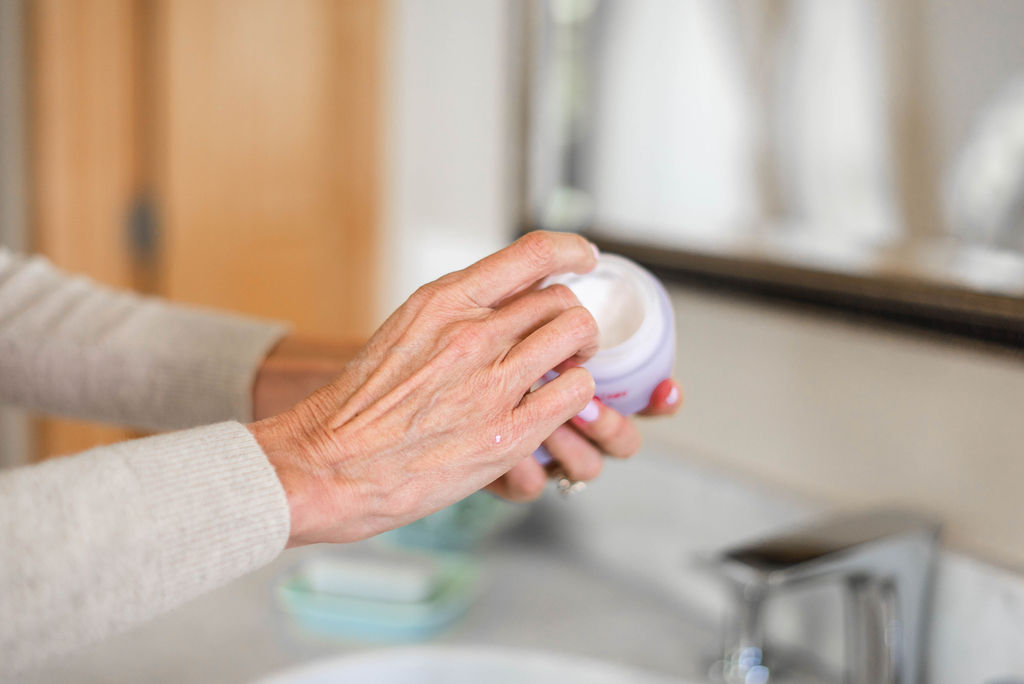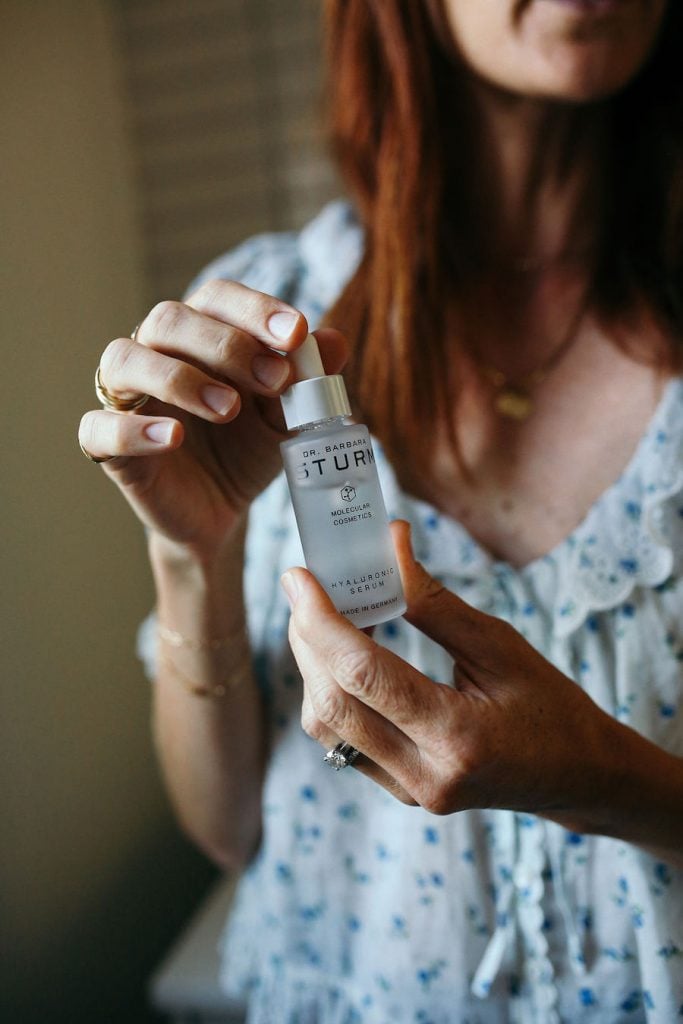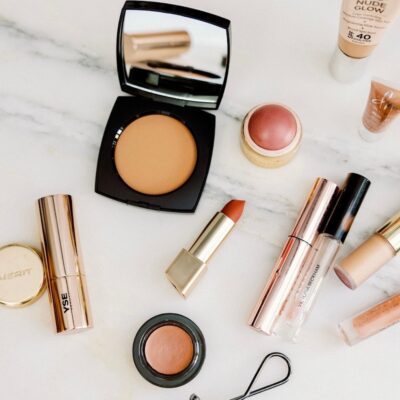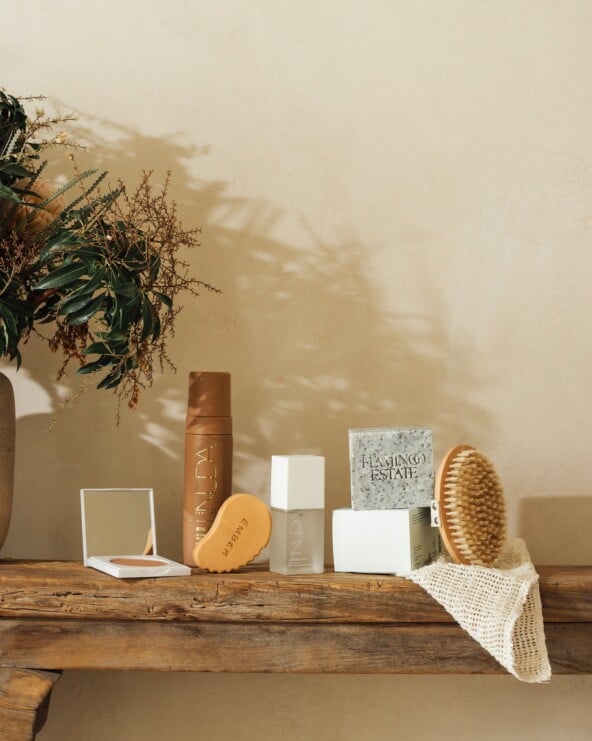In the fields of health, wellness, and skincare, emerging research and attention-grabbing trends shift the zeitgeist with a near daily speed. And while I love looking to experts to give me the scoop on all that’s new and in the now, I’m most fascinated by the science-backed, tried-and-true practices and ingredients that keep my mornings and evenings simple, streamlined, and sustainable. With that in mind, keep reading for the ultimate breakdown of the antioxidant benefits for skin to show you how this magical MVP of skincare can shine in your routine.
You’ve likely heard or at least come across articles sharing antioxidants’ role in helping you maintain a healthy diet, but did you know this class of ingredients can be applied topically to our skin for a fresh, glowing, and radiant complexion, too? I spoke to board-certified dermatologist, F. Victor Rueckl, MD at Lakes Dermatology to learn more and understand how we can incorporate these free radical-neutralizing ingredients into any healthy skincare routine.

Dr. Rueckl is a board-certified dermatologist and skin cancer surgeon. After completing his medical degree at Tufts University School of Medicine, Dr. Rueckl opened a private practice for dermatology and Mohs cancer surgery before later running the dermatology department at Kaiser Permanente in California.
First off, what is an antioxidant?
A buzzword in most wellness circles, antioxidants are written and spoken about everywhere, but am I the only one who struggles to offer up a clear and concise definition when asked? Can’t be. And in a similar vein, while we know we should be making antioxidants a crucial component of our skin health regimen, you’re probably also a little fuzzy on the why.
Dr. Rueckl defines antioxidants as the group of naturally-occurring compounds working hard to protect your cells from damage. “Free radicals, which are unstable molecules, are constantly being formed in your body and are caused by outside influences like pollution, poor air quality, sunlight, and smoking, among other factors,” he notes. “They are also caused internally through digestion and the lymphatic system.”
Essentially, antioxidants prevent free radicals from doing serious damage to our body. Two conditions that are often top of mind when it comes to skin health, inflammation and premature aging, can result from changes in our cells caused by free radicals. “Antioxidants have extra electrons and are able to donate an electron to free radicals, deactivating them and preventing them from continually causing damage,” says Dr. Rueckl.
Important: The goal isn’t to remove or even neutralize all free radicals. Balancing free radicals and antioxidants is key to helping your body and skin be at their best.


What are antioxidants’ role in our skincare routine?
Antioxidants are everywhere—they show up in over-the-counter products as well as medical-grade skincare. According to Dr. Rueckl, these topical treatments are an important step in keeping our skin healthy and protected. “Since the skin is the largest organ of the body, providing it with antioxidant health is one of the best ways to neutralize free radicals that affect it environmentally and topically,” he advises.
The list of benefits antioxidant-rich skincare products can provide is nothing short of impressive. Calming inflammation, slowing down the effects of aging, and protecting against UV damage are all included. Dr. Rueckl’s go-to favorite? “I love the SkinCeutical C E Ferulic because it’s a great source of antioxidants and is clinically proven to provide environmental protection against common signs of aging,” he explains.


Can you mix and match antioxidants?
By now we a’re all aware that less is more when it comes to skincare, but I’d be lying if I said I wasn’t tempted to pile on antioxidant-packed skincare to reap the myriad benefits. But could this do more harm than good? Turns out, Dr. Rueckl gives us the green light to mix and match as you please. “You can absolutely mix antioxidants,” he outlines. “There are a slew of antioxidant types and you’ll never see the word ‘antioxidant’ on your skincare ingredients list. The point of all antioxidants is to fight free radical damage.”


Here’s a rundown of key antioxidants for skin, and all the amazing ways they can benefit your skin:
Vitamin C
What it is: If you’ve done some digging already into antioxidants, then you likely know a little about Vitamin C. Well-loved and widely-studied, Vitamin C (also called L-ascorbic acid) is a key player in forming healthy skin tissue.
How it works: Vitamin C boosts collagen production, protects against oxidative stress, and offers up visible anti-aging benefits.
Who should use it: According to Dr. Rueckl, everyone but there are different variations for all skin types. He also cautions against trusting any brand on the shelf: “The difficulty with Vitamin C is finding one that is properly formulated as this ingredient is notoriously misused in skincare due to its instability and difficulty in formulations,” he stresses. If you’ll recall from above, his preferred brand is SkinCeutical C E Ferulic.
Vitamin E
What it is: Vitamin E is the essential fatty antioxidant that can really do no wrong. Also referred to as alpha-tocopherol, when applied topically, Vitamin E soothes and heals cuts and scars by speeding up the body’s natural healing process.
How it works: Vitamin E helps in neutralizing free radicals, moisturizing skin, and improves the appearance of aging skin.
Who should use it: Sensitive skin types, rejoice. Dr. Rueckl says that Vitamin E is often combined with Vitamin C products, a particularly effective combo for those with sensitive and dry skin.
Niacinamide
What it is: Or more importantly, what isn’t it? This darling of the skincare world is getting a lot of attention lately and it’s all well-deserved. Niacinamide provides a whole host of benefits without any uncomfortable side effects (irritation and skin damage—no thanks). Note that you might also see it called Vitamin B3.
How it works: Dr. Rueckl says niacinamide has been shown to strengthen the skin’s moisture barrier. It reduces the appearance of discoloration and blotchiness and helps fade dark marks.
Who should use it: You’ll see Niacinamide primarily in products designed for discoloration as a result of photo aging and sun damage (on that note, reminder to reapply your sunscreen all throughout the sunny months and beyond).
Retinol
What it is: Retinol is everywhere these days, and contrary to what you may have heard, it’s an antioxidant that we can all benefit from incorporating into our skincare routine starting in our mid-20s. This skincare hero comes with no shortage of amazing advantages. Improving texture, taming acne, minimizing the appearance of pores, slowing down the skin’s aging—you name it, retinol does it.
How it works: Retinol speeds up cell turnover and firms the skin by plumping up fine lines and wrinkles. Another antioxidant that increases collagen stimulation, retinol is my go-to buzzy skin saver.
Who should use it: Before you go out and buy a bottle, know that retinol isn’t for everyone. Those experiencing rosacea, eczema, or psoriasis should be particularly cautious or avoid it altogether. If you have a sensitive complexion, it’s possible that retinol may irritate your skin.
But, as Dr. Rueckl reminded me, there are varying strengths of retinol—”It’s just a matter of finding one that you can control the tolerability of and using products with it that helps to minimize redness and irritation,” he adds.
Polyphenols
What it is: Raise your hand if you’ve heard of polyphenols because red wine is full of them. Of course, your glass of vino isn’t the only source of polyphenols—they’re actually the most prevalent antioxidant found in a well-balanced diet. Fruits, veggies, teas, spices—you name it, eat it, or drink it—it could very well contain polyphenols.
How it works: Tread cautiously when it comes to treating polyphenols as a miracle cure, as more work needs to be done in understanding the benefits of these antioxidants. Dr. Rueckl’s take: “Polyphenols have been shown to be effective in limiting UV exposure, but more research and incorporation into products is needed.”
Who should use it: At present, topically-applied products containing polyphenols often have a green tea base which can be irritating to a wide array of skin types.
Hyaluronic Acid
What it is: I’m a true hyaluronic acid stan, but know that while it’s not technically an antioxidant, it does play well with antioxidant-containing products.
How it works: When used topically, hyaluronic acid can have a plumping effect on the skin, reducing the visibility of fine lines and wrinkles. It moisturizes and provides structure for cells, supporting improved skin texture and all-around smooth skin.
Who should use it: Dr. Rueckl recommends hyaluronic acid for anyone regardless of age or skin type, but adds this caveat: “Hyaluronic acid must be in the right formulation or it doesn’t absorb at all!”
Have you started incorporating antioxidants into your skincare routine? Let us know which ones are your faves!






